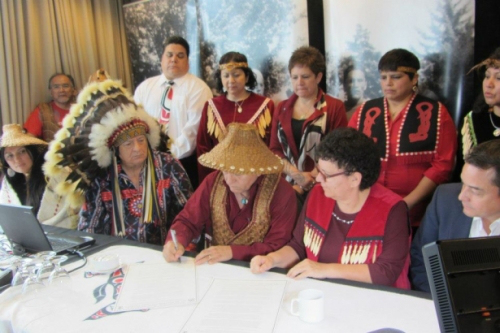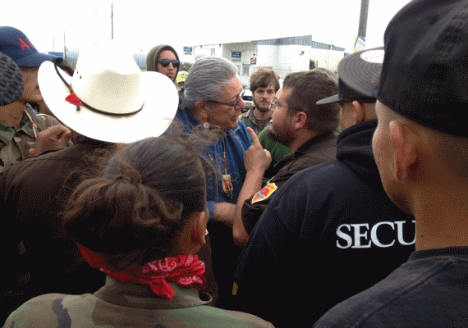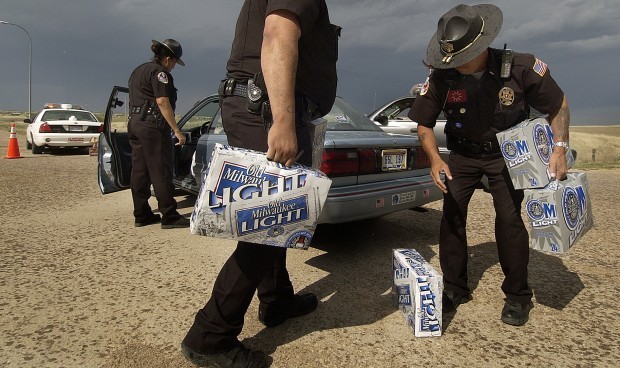Denise DePaolo, KSFY.com
An 1832 act of Congress prohibited all alcohol in Indian Country.
Today, Pine Ridge is the only South Dakota reservation that remains dry. Despite that status, alcoholism and alcohol-related crime run rampant.
Recently, the Oglala Sioux Tribal Council decided that the people should vote on whether to allow sales on the reservation.
For some, the issue is about tradition. For others, it’s about maintaining sovereignty. And for others yet, it’s about ending the steady flow of money over the border to a tiny town called White Clay, Nebraska.
White Clay – population approximately 14 – is an unincorporated town located a couple miles from Pine Ridge – the largest community on the reservation of the same name.
Alcohol is White Clay’s big industry – really, its only industry – and many Oglala are angry.
“It’s committing slow genocide on our people,” said tribal member Olowan Martinez.
More than four million cans of beer are sold in White Clay’s four liquor stores each year – mostly to tribal members. Meaning the money is leaving not only the reservation, but the state.
Now, in a special election August 13, the people will decide whether to allow alcohol sales on Pine Ridge.
Tribal Vice President Tom Poor Bear doesn’t think that’s enough time.
“I don’t feel we’re ready for it. I feel there’s a lot of questions to be asked. We need to regulate it right to begin with. We need to change a lot of laws within our tribal code that surround alcohol.”
Part of Poor Bear’s concern involves allowing outside government in.
“You know, my biggest concern on this is I really feel we really need to do our homework in depth, and we really need to do some research. Because what I’m afraid of is state jurisdiction. We are a sovereign nation. And we’re going to be buying this alcohol – if it is legalized – from the state. We probably have to get an alcohol tax, which violates the treaty, because we’re a tax exempt people. Is State Patrol going to be allowed to patrol our reservation highways?” asked Poor Bear.
Many make the argument that the only way to stop hemorrhaging money into White Clay, and stop other problems that come with alcohol is to take the power back and eradicate what many consider a parasite.
“They’re just sucking us. Capitalizing on the disease that we have. White Clay is just…we’re in the belly of another little monster,” said Poor Bear.
For some, that means the tribe selling its own alcohol and using revenues toward treatment and prevention programs. For others, like a group of tribal members camped at the border since April 30, the solution is a return to traditional ways – saying no to alcohol under all circumstances.
“There are many issues facing White Clay, but personally for us here, the main goal we’re trying to achieve is changing the mentality of our nation. If we teach a ten-year-old today that alcohol is the enemy, and any time their parents bring it into their home, they know there’s an enemy in their home,” said Martinez, who is part of the months-long protest.
When asked about the example set by other tribes that have legalized alcohol, perspectives differed.
“We don’t want to join the rest of the sell-out tribes, by allowing alcohol or the state in. That’s out of the question for many of us. We’re the only nation that defeated the U.S. government, and we will never forget that,” said Martinez.
“I’ve been to other reservations that aren’t dry reservations. Like our neighbors to the east, the Sicangus – the Rosebuds – they do sell alcohol there. I do go to Rosebud a lot, and I don’t see the White Clays on Rosebud. Where you see empty cans, empty bottles. Their reservation’s really clean,” said Poor Bear.
And while opinions differ on the alcohol question, tribal members KSFY News spoke with acknowledge that the Oglala people must be the ones to answer.
“I don’t think we should dictate to our people how they should live their lives,” said Poor Bear.
“We know it’s not going to pass. Because when we set our camp up, we went to ceremony, and the spirits aren’t gonna have us put our camp here and give up our lives to break our hearts in the end,” said tribal member Misty Sioux Little.
Off-sale liquor licenses were first issued in White Clay during the 1970’s.
Today, more than 90-percent of crime in and around the tiny town is alcohol-related.
![South Dakota state Rep. Elizabeth May (R) [YouTube]](http://www.tulalipnews.com/wp/wp-content/uploads/2015/02/South-Dakota-state-Rep.-Elizabeth-May-R-YouTube-800x430-e1425063108759.jpg)









